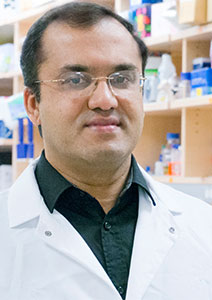Case Western Reserve University School of Medicine researcher leading development of drug to suppress autoimmunity leading to type 1 diabetes; supported by JDRF
A research team led by Case Western Reserve University School of Medicine scientist Parameswaran Ramakrishnan is developing a drug to reduce the number of insulin injections needed by children with type 1 diabetes.
Generally, people with diabetes either don’t produce enough insulin or can’t sufficiently use the insulin their bodies make, resulting in too much blood sugar in the bloodstream. That can lead to serious health problems over time if untreated, such as heart disease, vision loss, nerve damage and kidney disease. The condition requires daily insulin injections.
And while people with type 1 diabetes represent only about 10% of the more than 37 million Americans with diabetes, it is more common in children, according to the Centers for Disease Control. Scientists believe that an autoimmune reaction causes Type 1 diabetes. In short, the body mistakenly attacks itself and stops making insulin.

So Ramakrishnan, an associate professor of pathology, and his team—including scientists from New York University (NYU) and the University of
California-San Diego (UCSD)—have focused on helping children with type 1 diabetes: “We asked the question ‘What if we could block the root cause—suppress the ongoing self-reactive process?’” he said.
The research team is testing a protein block to suppress specific cells of the body’s immune system that contribute to developing type 1 diabetes. If successful, the drug would diminish autoimmunity, preserving the body’s ability to naturally produce more insulin, Ramakrishnan said.
JDRF awarded the team a three-year grant to help accelerate the research.
Others involved in the research include Kent Kirshenbaum, a chemistry professor at NYU; and Jonathan Pokorski, an associate professor of nanoengineering at UCSD.
Blocking T cells to allow insulin production
The Case Western Reserve group focused on finding how to isolate and suppress only a part of the body’s immune system cells—the self-reactive T cells, which destroy insulin-producing pancreatic beta cells.
Ramakrishnan and his team built on his earlier research published almost 10 years ago that identified a mechanism controlling the genes involved in autoimmunity in type 1 diabetes.
“We’ve known for decades that if we blocked T cells in type 1 diabetes, the body would be able to make insulin, but we need those T cells to clear out cancer cells and virus-infected cells,” Ramakrishnan said. “What we’ve done is identified one protein—one very targeted site in the protein modified by a sugar—that plays a central role in controlling T-cell function.”
The researchers then developed chemical agents to block the specific function of the sugar-modified protein, which acts abnormally when blood sugar is elevated, such as with diabetes, he said.
Ramakrishnan’s team has two patents related to this current work—one on the function of sugar-modified protein and another on the drug targeting the sugar-modified protein. He said a drug to reduce the number of insulin injections a child with type 1 diabetes would need could be five to 10 years away.
“Someday, we hope a child getting several shots a day may only need a shot once a week or so,” he said. “There are many more hurdles along the way, but we are pleased with our results so far.”
Blood sugar and diabetes
Type 1 and type 2 diabetes are chronic health conditions that affect how the body turns food into energy.
The body breaks most food into sugar and released into the bloodstream. When blood sugar increases, it signals to the pancreas to release insulin, which acts like a key to let the blood sugar into the body’s cells for energy.
Most people with diabetes have type 2. Doctors usually diagnose adults with type 2 diabetes, although they are more often also diagnosing teens and younger adults. People can prevent or delay type 2 diabetes with healthy lifestyle changes, such as losing weight, eating healthy food and exercise.
For more information, contact Mike Scott at mike.scott@case.edu.

